跨文化交际之中英禁忌语比较
- 格式:ppt
- 大小:2.26 MB
- 文档页数:41
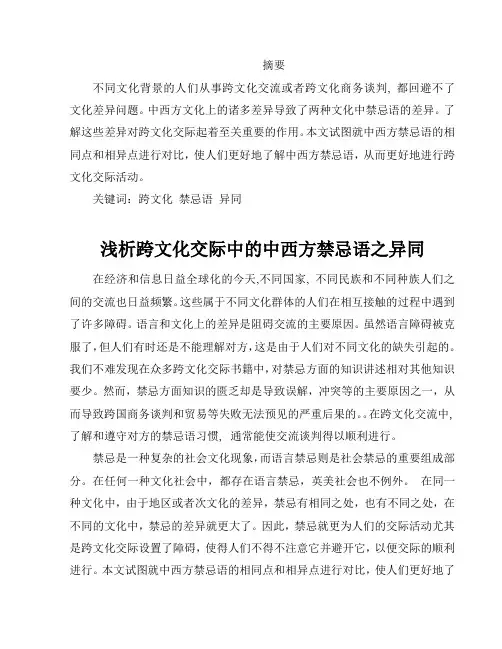
摘要不同文化背景的人们从事跨文化交流或者跨文化商务谈判, 都回避不了文化差异问题。
中西方文化上的诸多差异导致了两种文化中禁忌语的差异。
了解这些差异对跨文化交际起着至关重要的作用。
本文试图就中西方禁忌语的相同点和相异点进行对比,使人们更好地了解中西方禁忌语,从而更好地进行跨文化交际活动。
关键词:跨文化禁忌语异同浅析跨文化交际中的中西方禁忌语之异同在经济和信息日益全球化的今天,不同国家, 不同民族和不同种族人们之间的交流也日益频繁。
这些属于不同文化群体的人们在相互接触的过程中遇到了许多障碍。
语言和文化上的差异是阻碍交流的主要原因。
虽然语言障碍被克服了,但人们有时还是不能理解对方,这是由于人们对不同文化的缺失引起的。
我们不难发现在众多跨文化交际书籍中,对禁忌方面的知识讲述相对其他知识要少。
然而,禁忌方面知识的匮乏却是导致误解,冲突等的主要原因之一,从而导致跨国商务谈判和贸易等失败无法预见的严重后果的。
在跨文化交流中, 了解和遵守对方的禁忌语习惯, 通常能使交流谈判得以顺利进行。
禁忌是一种复杂的社会文化现象,而语言禁忌则是社会禁忌的重要组成部分。
在任何一种文化社会中,都存在语言禁忌,英美社会也不例外。
在同一种文化中,由于地区或者次文化的差异,禁忌有相同之处,也有不同之处,在不同的文化中,禁忌的差异就更大了。
因此,禁忌就更为人们的交际活动尤其是跨文化交际设置了障碍,使得人们不得不注意它并避开它,以便交际的顺利进行。
本文试图就中西方禁忌语的相同点和相异点进行对比,使人们更好地了解中西方禁忌语,从而更好地进行跨文化交际。
一.中西禁忌语的相似之处1.1.对敏感词的禁忌无论是东方文化还是西方文化,都对“死”怀有强烈的恐惧, 极不愿意提及“死”字。
汉文化里“死”是人们最忌讳的字眼,人们忌讳谈死,在语言交际中总是回避“死”,尽量用其他词语代替。
据《汉语委婉语词典》记载,汉语中表示死亡的委婉语有481 条之多,英语中类似“死”的委婉语也有400 余条。
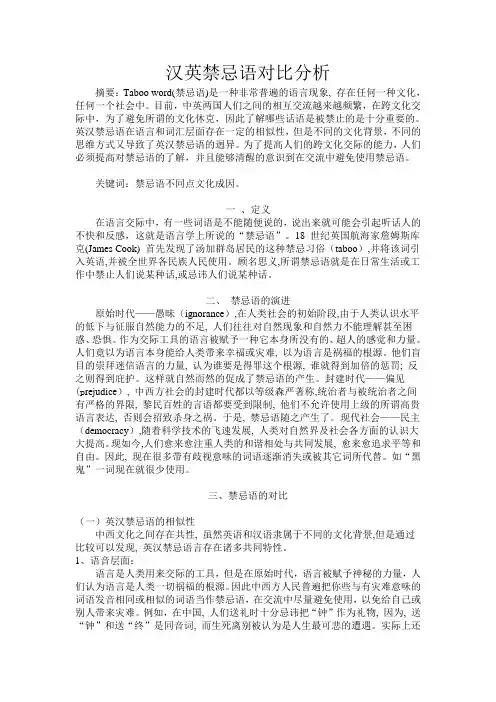
汉英禁忌语对比分析摘要:Taboo word(禁忌语)是一种非常普遍的语言现象, 存在任何一种文化,任何一个社会中。
目前,中英两国人们之间的相互交流越来越频繁,在跨文化交际中,为了避免所谓的文化休克,因此了解哪些话语是被禁止的是十分重要的。
英汉禁忌语在语言和词汇层面存在一定的相似性,但是不同的文化背景,不同的思维方式又导致了英汉禁忌语的迥异。
为了提高人们的跨文化交际的能力,人们必须提高对禁忌语的了解,并且能够清醒的意识到在交流中避免使用禁忌语。
关键词:禁忌语不同点文化成因。
一、定义在语言交际中,有一些词语是不能随便说的,说出来就可能会引起听话人的不快和反感,这就是语言学上所说的“禁忌语”。
18 世纪英国航海家詹姆斯库克(James Cook) 首先发现了汤加群岛居民的这种禁忌习俗(taboo),并将该词引入英语,并被全世界各民族人民使用。
顾名思义,所谓禁忌语就是在日常生活或工作中禁止人们说某种话,或忌讳人们说某种话。
二、禁忌语的演进原始时代——愚昧(ignorance),在人类社会的初始阶段,由于人类认识水平的低下与征服自然能力的不足, 人们往往对自然现象和自然力不能理解甚至困惑、恐惧。
作为交际工具的语言被赋予一种它本身所没有的、超人的感觉和力量。
人们竟以为语言本身能给人类带来幸福或灾难, 以为语言是祸福的根源。
他们盲目的崇拜迷信语言的力量, 认为谁要是得罪这个根源, 谁就得到加倍的惩罚; 反之则得到庇护。
这样就自然而然的促成了禁忌语的产生。
封建时代——偏见(p rejudice), 中西方社会的封建时代都以等级森严著称,统治者与被统治者之间有严格的界限, 黎民百姓的言语都要受到限制, 他们不允许使用上级的所谓高贵语言表达, 否则会招致杀身之祸。
于是, 禁忌语随之产生了。
现代社会——民主(democracy),随着科学技术的飞速发展, 人类对自然界及社会各方面的认识大大提高。
现如今,人们愈来愈注重人类的和谐相处与共同发展, 愈来愈追求平等和自由。

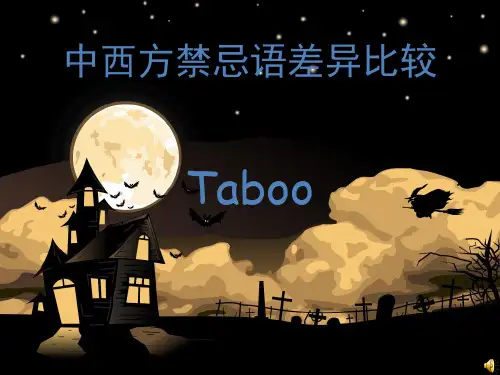
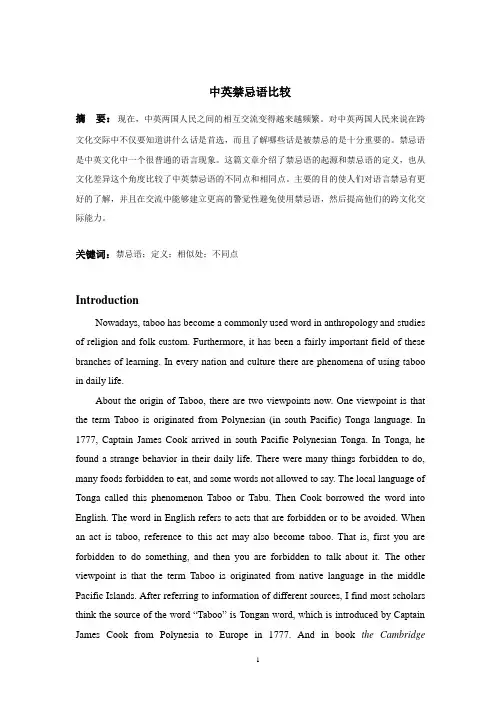
中英禁忌语比较摘要:现在,中英两国人民之间的相互交流变得越来越频繁。
对中英两国人民来说在跨文化交际中不仅要知道讲什么话是首选,而且了解哪些话是被禁忌的是十分重要的。
禁忌语是中英文化中一个很普通的语言现象。
这篇文章介绍了禁忌语的起源和禁忌语的定义,也从文化差异这个角度比较了中英禁忌语的不同点和相同点。
主要的目的使人们对语言禁忌有更好的了解,并且在交流中能够建立更高的警觉性避免使用禁忌语,然后提高他们的跨文化交际能力。
关键词:禁忌语;定义;相似处;不同点IntroductionNowadays, taboo has become a commonly used word in anthropology and studies of religion and folk custom. Furthermore, it has been a fairly important field of these branches of learning. In every nation and culture there are phenomena of using taboo in daily life.About the origin of Taboo, there are two viewpoints now. One viewpoint is that the term Taboo is originated from Polynesian (in south Pacific) Tonga language. In 1777, Captain James Cook arrived in south Pacific Polynesian Tonga. In Tonga, he found a strange behavior in their daily life. There were many things forbidden to do, many foods forbidden to eat, and some words not allowed to say. The local language of Tonga called this phenomenon Taboo or Tabu. Then Cook borrowed the word into English. The word in English refers to acts that are forbidden or to be avoided. When an act is taboo, reference to this act may also become taboo. That is, first you are forbidden to do something, and then you are forbidden to talk about it. The other viewpoint is that the term Taboo is originated from native language in the middle Pacific Islands. After referring to information of different sources, I find most scholars think the source of the word “Taboo” is Tongan word, which is introduced by Captain James Cook from Polynesia to Europe in 1777. And in book the CambridgeEncyclopedia of Language, when it defines “Taboo”, it point s out clearly that Taboo has been borrowed from Tongan.1. Definition of Taboo1.1 Definition of TabooSigmund Freud, the founder of psychoanalytic school, put forward interesting and detailed discussions on taboos in his classical work Totem and Taboo. He pointed out that taboos contained two opposite meanings: on one hand, it was lofty, sacred; on the other hand, it was mysterious, dangerous, prohibitive and unclean. On the basis of Freud’s views, the Oxford Advanced Learner’s English-Chinese dictionary defines the word “Taboo” as follows: “a) ban or prohibition on something that is regarded for religious or other reasons as not to be done, touched, used, spoken of etc. b) general agreement not to discuss or to do something.”(Oxford Advanced Learner’s English-Chinese dictionary,2000 )We can also find the definition in the Cambridge Encyclopedia of Language: “Taboo has been borrowed from Tongan, w here it means ‘holy’ or ‘untouchable’. Taboos exist in all known cultures, referring to certain acts, objects, or relationships which society wishes to avoid-and thus the language used to talk about them. Verbal taboos are generally related to sex, the supernatural, excretion, and death, but quite often they extend to other aspects of domestic and social life.”(David,1997) In short, from these definitions of taboo, we can know all the taboos are likely to be considered sacred, dangerous, inviolable or obscene by certain people. It is usually not spoken directly.1.2 Differences between Taboo and EuphemismMany people think that taboo is to a degree similar to euphemism. In our daily life, we often meet certain things we cannot say directly, so we use language which can help us avoid saying certain things as well as to express them. Certain things are not said, not because there’s no way to express them, but because people do not want to talk about those things; or if those things are to be talked about, they are talked about in very roundabout ways. In the first case we have instance of linguistic taboo; in thesecond case we have the employment of euphemism so as to avoid mentioning certain things directly.Taboo is the prohibition or avoidance in any society of behavior believed to be harmful to its members in that it would cause them anxiety, embarrassment, or shame. Euphemism is more obvious than taboo words and expressions in our society. Euphemistic words and expressions allow us to talk about unpleasant things and “neutralize” the unpleasantness. They also allow us to give labels to unpleasant tasks and jobs in an attempt to make them sound almost attractive. These two linguistic are have some similar, however, each group is different from each other in how it constrains linguistic behavior in one way. Taboo is certain things that we cannot say, and euphemism is a linguistic we say certain things by better way, and then make people more comfortable.Taboo and euphemism affect us in all aspects of life. When we speak, we must constantly make choices of many different kinds: what we want to say, how we say it, and the specific sentence patterns, words and expressions that best unite the “what’s”with the “how’s”. We should know some words we never and hardly use when we are talking with others. If we use these words, it may cause some troubles in communication.2. Similar taboos in English and ChineseWith the development of science and technology, the world becomes smaller and smaller; the increasing communication between different countries and nations make the mutual understanding more and more important. Thus, different social values and life customs blend as well as collide with one another. People in one culture may not use euphemism when referring to a social phenomenon while in another culture euphemism is the preferred way people address it. So the former may find a different equivalent in the latter’s language. For instance, English-speaking people usually substitute “underachieve” for “slow student” and nowadays Chinese people also tend to use the euphemistic phrase“后进生”instead of “差生”. In present society,taboo plays a considerably important part in the development of cross-cultural communication in English and Chinese.According to International English Usage, there are mainly six taboo aspects as follows, religion and god, sex, secretions and excretions, disease and death, society, and privacy regarding age, weight, income etc. I have read some book about Chinese culture. Then, I compare English taboos with Chinese taboos. Chinese taboos are similar to English taboos. Chinese taboos also contain mainly six aspects.2.1 Religion and GodIn English-speaking countries, most people believe Christianity, they have a strong sense of religion, and people are strictly prohibited from mentioning God’s name. In the third commandment of Ten Commandments, it says,”Thou shalt not speak my name in vain”. Once you break the rule, you will be criticized or even be alienated by other members. Jesus Christ was a Jew who lived in Palestine 2000 years ago and is accepted by Christians as the Son of God. So in these countries, the religious terms like God, devil, Christ, damn, Jesus Christ etc, are only allowed to be mentioned in serious talk. If someone mentions Jesus Christ in casual talk or in a joke, he will be considered impolite. However, when English people scold someone, they will use these words:“For Christ's sake!” , “God damned!”, “Hell!”, “ Oh, damn it!”In Chinese, it is similar for people to avoid calling God’s name. Most Chinese people believe Buddhism, they also do not mention God’s name. They often call God such as“玉皇大帝”,“大圣”,“佛主” etc. when they swears, they will use sky, such as “上苍作证”, “对天发誓”,“上天为证”。
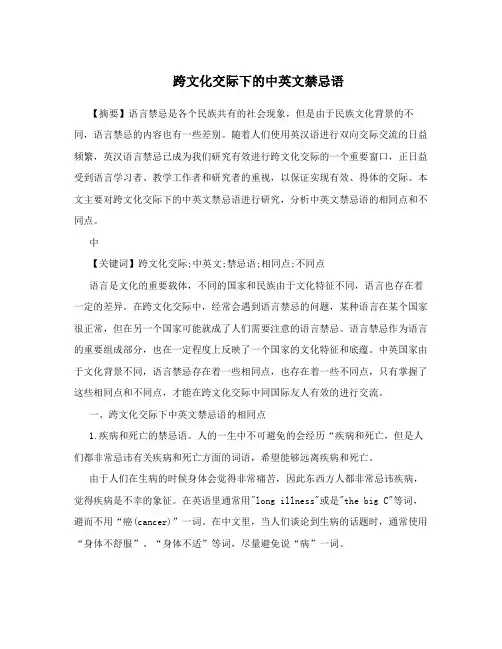
跨文化交际下的中英文禁忌语【摘要】语言禁忌是各个民族共有的社会现象,但是由于民族文化背景的不同,语言禁忌的内容也有一些差别。
随着人们使用英汉语进行双向交际交流的日益频繁,英汉语言禁忌已成为我们研究有效进行跨文化交际的一个重要窗口,正日益受到语言学习者、教学工作者和研究者的重视,以保证实现有效、得体的交际。
本文主要对跨文化交际下的中英文禁忌语进行研究,分析中英文禁忌语的相同点和不同点。
中【关键词】跨文化交际;中英文;禁忌语;相同点;不同点语言是文化的重要载体,不同的国家和民族由于文化特征不同,语言也存在着一定的差异。
在跨文化交际中,经常会遇到语言禁忌的问题,某种语言在某个国家很正常,但在另一个国家可能就成了人们需要注意的语言禁忌。
语言禁忌作为语言的重要组成部分,也在一定程度上反映了一个国家的文化特征和底蕴。
中英国家由于文化背景不同,语言禁忌存在着一些相同点,也存在着一些不同点,只有掌握了这些相同点和不同点,才能在跨文化交际中同国际友人有效的进行交流。
一、跨文化交际下中英文禁忌语的相同点1.疾病和死亡的禁忌语。
人的一生中不可避免的会经历“疾病和死亡,但是人们都非常忌讳有关疾病和死亡方面的词语,希望能够远离疾病和死亡。
由于人们在生病的时候身体会觉得非常痛苦,因此东西方人都非常忌讳疾病,觉得疾病是不幸的象征。
在英语里通常用"long illness"或是"the big C"等词,避而不用“癌(cancer)”一词。
在中文里,当人们谈论到生病的话题时,通常使用“身体不舒服”、“身体不适”等词,尽量避免说“病”一词。
死亡是人们最不愿意看到的字眼,在中英文中表达死亡的词都比较隐晦。
如在英文中通常用“be gone,be no more,,ent off,,ent the,ay of all f lesh”等词。
汉语中仅在《汉语委婉语词典》中表示死亡的别称就有481条之多,有升天、归天、谢世、辞世、与世长辞,寿终正寝、仙逝等。
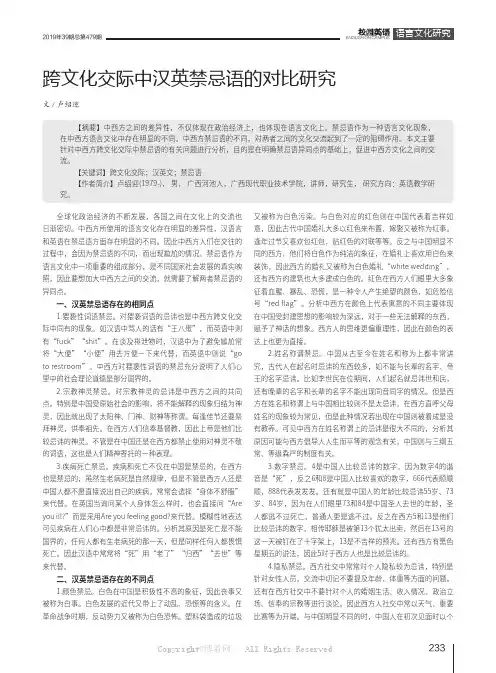
2019年39期总第479期ENGLISH ON CAMPUS跨文化交际中汉英禁忌语的对比研究 文/卢绍迎全球化政治经济的不断发展,各国之间在文化上的交流也日渐密切。
中西方所使用的语言文化存在明显的差异性,汉语言和英语在禁忌语方面存在明显的不同。
因此中西方人们在交往的过程中,会因为禁忌语的不同,而出现尴尬的情况。
禁忌语作为语言文化中一项重要的组成部分,是不同国家社会发展的真实映照,因此要想加大中西方之间的交流,就需要了解两者禁忌语的异同点。
一、汉英禁忌语存在的相同点1.猥亵性词语禁忌。
对猥亵词语的忌讳也是中西方跨文化交际中同有的现象。
如汉语中骂人的话有“王八蛋”,而英语中则有“fuck”“shit”。
在谈及排泄物时,汉语中为了避免尴尬常将“大便”“小便”用去方便一下来代替,而英语中则说“go to restroom”。
中西方对猥亵性词语的禁忌充分说明了人们心里中的社会理论道德是部分国界的。
2.宗教神灵禁忌。
对宗教神灵的忌讳是中西方之间的共同点。
特别是中国受原始社会的影响,将不能解释的现象归结为神灵,因此就出现了太阳神、门神、财神等称谓。
每逢佳节还要祭拜神灵,供奉祖先。
在西方人们信奉基督教,因此上帝是他们比较忌讳的神灵。
不管是在中国还是在西方都禁止使用对神灵不敬的词语,这也是人们精神寄托的一种表现。
3.疾病死亡禁忌。
疾病和死亡不仅在中国是禁忌的,在西方也是禁忌的,虽然生老病死是自然规律,但是不管是西方人还是中国人都不愿直接说出自己的疾病,常常会选择“身体不舒服”来代替。
在英国当询问某个人身体怎么样时,也会直接问“Are you ill?”而是采用Are you feeling good?来代替。
模糊性地表达可见疾病在人们心中都是非常忌讳的。
分析其原因是死亡是不能国界的,任何人都有生老病死的那一天,但是同样任何人都畏惧死亡。
因此汉语中常常将“死”用“老了”“归西”“去世”等来代替。
二、汉英禁忌语存在的不同点1.颜色禁忌。
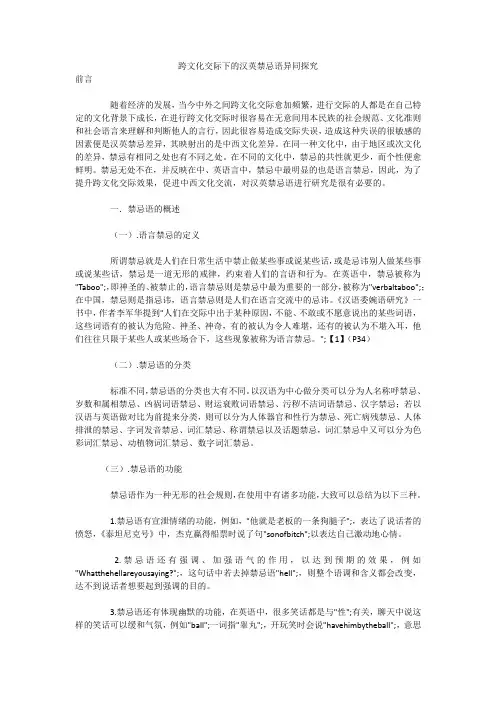
跨文化交际下的汉英禁忌语异同探究前言随着经济的发展,当今中外之间跨文化交际愈加频繁,进行交际的人都是在自己特定的文化背景下成长,在进行跨文化交际时很容易在无意间用本民族的社会规范、文化准则和社会语言来理解和判断他人的言行,因此很容易造成交际失误,造成这种失误的很敏感的因素便是汉英禁忌差异,其映射出的是中西文化差异。
在同一种文化中,由于地区或次文化的差异,禁忌有相同之处也有不同之处。
在不同的文化中,禁忌的共性就更少,而个性便愈鲜明。
禁忌无处不在,并反映在中、英语言中,禁忌中最明显的也是语言禁忌,因此,为了提升跨文化交际效果,促进中西文化交流,对汉英禁忌语进行研究是很有必要的。
一.禁忌语的概述(一).语言禁忌的定义所谓禁忌就是人们在日常生活中禁止做某些事或说某些话,或是忌讳别人做某些事或说某些话,禁忌是一道无形的戒律,约束着人们的言语和行为。
在英语中,禁忌被称为"Taboo";,即神圣的、被禁止的,语言禁忌则是禁忌中最为重要的一部分,被称为"verbaltaboo";;在中国,禁忌则是指忌讳,语言禁忌则是人们在语言交流中的忌讳。
《汉语委婉语研究》一书中,作者李军华提到"人们在交际中出于某种原因,不能、不敢或不愿意说出的某些词语,这些词语有的被认为危险、神圣、神奇,有的被认为令人难堪,还有的被认为不堪入耳,他们往往只限于某些人或某些场合下,这些现象被称为语言禁忌。
";【1】(P34)(二).禁忌语的分类标准不同,禁忌语的分类也大有不同。
以汉语为中心做分类可以分为人名称呼禁忌、岁数和属相禁忌、凶祸词语禁忌、财运衰败词语禁忌、污秽不洁词语禁忌、汉字禁忌;若以汉语与英语做对比为前提来分类,则可以分为人体器官和性行为禁忌、死亡病残禁忌、人体排泄的禁忌、字词发音禁忌、词汇禁忌、称谓禁忌以及话题禁忌,词汇禁忌中又可以分为色彩词汇禁忌、动植物词汇禁忌、数字词汇禁忌。
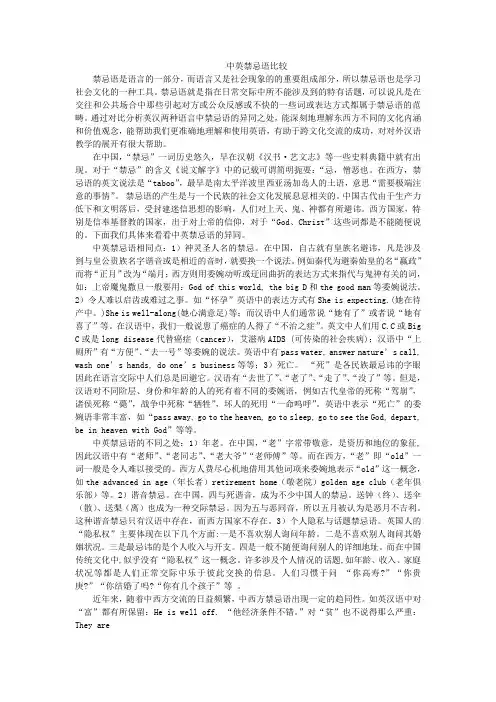
中英禁忌语比较禁忌语是语言的一部分,而语言又是社会现象的的重要组成部分,所以禁忌语也是学习社会文化的一种工具。
禁忌语就是指在日常交际中所不能涉及到的特有话题,可以说凡是在交往和公共场合中那些引起对方或公众反感或不快的一些词或表达方式都属于禁忌语的范畴。
通过对比分析英汉两种语言中禁忌语的异同之处,能深刻地理解东西方不同的文化内涵和价值观念,能帮助我们更准确地理解和使用英语,有助于跨文化交流的成功,对对外汉语教学的展开有很大帮助。
在中国,“禁忌”一词历史悠久,早在汉朝《汉书·艺文志》等一些史料典籍中就有出现。
对于“禁忌”的含义《说文解字》中的记载可谓简明扼要:“忌,憎恶也。
在西方,禁忌语的英文说法是“taboo”,最早是南太平洋波里西亚汤加岛人的土语,意思“需要极端注意的事情”。
禁忌语的产生是与一个民族的社会文化发展息息相关的。
中国古代由于生产力低下和文明落后,受封建迷信思想的影响,人们对上天、鬼、神都有所避讳。
西方国家,特别是信奉基督教的国家,出于对上帝的信仰,对于“God、Christ”这些词都是不能随便说的。
下面我们具体来看看中英禁忌语的异同。
中英禁忌语相同点:1)神灵圣人名的禁忌。
在中国,自古就有皇族名避讳,凡是涉及到与皇公贵族名字谐音或是相近的音时,就要换一个说法。
例如秦代为避秦始皇的名“赢政”而将“正月”改为“端月;西方则用委婉动听或迂回曲折的表达方式来指代与鬼神有关的词,如:上帝魔鬼撒旦一般要用:God of this world, the big D和the good man等委婉说法。
2)令人难以启齿或难过之事。
如“怀孕”英语中的表达方式有She is expecting.(她在待产中。
)She is well-along(她心满意足)等;而汉语中人们通常说“她有了”或者说“她有喜了”等。
在汉语中,我们一般说患了癌症的人得了“不治之症”。
英文中人们用C.C或Big C或是long disease代替癌症(cancer),艾滋病AIDS (可传染的社会疾病);汉语中“上厕所”有“方便”、“去一号”等委婉的说法。

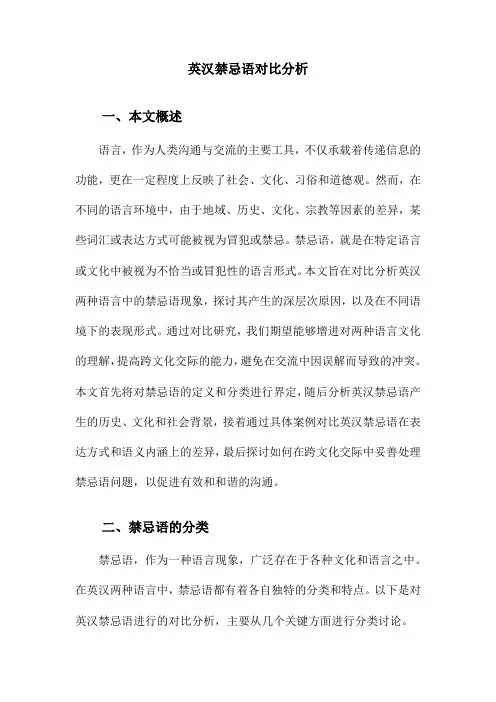
英汉禁忌语对比分析一、本文概述语言,作为人类沟通与交流的主要工具,不仅承载着传递信息的功能,更在一定程度上反映了社会、文化、习俗和道德观。
然而,在不同的语言环境中,由于地域、历史、文化、宗教等因素的差异,某些词汇或表达方式可能被视为冒犯或禁忌。
禁忌语,就是在特定语言或文化中被视为不恰当或冒犯性的语言形式。
本文旨在对比分析英汉两种语言中的禁忌语现象,探讨其产生的深层次原因,以及在不同语境下的表现形式。
通过对比研究,我们期望能够增进对两种语言文化的理解,提高跨文化交际的能力,避免在交流中因误解而导致的冲突。
本文首先将对禁忌语的定义和分类进行界定,随后分析英汉禁忌语产生的历史、文化和社会背景,接着通过具体案例对比英汉禁忌语在表达方式和语义内涵上的差异,最后探讨如何在跨文化交际中妥善处理禁忌语问题,以促进有效和和谐的沟通。
二、禁忌语的分类禁忌语,作为一种语言现象,广泛存在于各种文化和语言之中。
在英汉两种语言中,禁忌语都有着各自独特的分类和特点。
以下是对英汉禁忌语进行的对比分析,主要从几个关键方面进行分类讨论。
在英汉两种文化中,宗教都是重要的组成部分。
因此,与宗教相关的禁忌语也格外显著。
在汉语中,佛教和道教的宗教用语和象征都有严格的禁忌,如不得随意提及佛祖、道祖的名字,以及与之相关的神圣事物。
而在英语中,基督教的影响深远,涉及上帝、耶稣等神圣名词的言论都需要谨慎处理,以避免冒犯信仰者。
社会禁忌语主要涉及与社会习俗、道德规范等相关的内容。
在汉语中,对长辈、权威人物的称呼和言论有着严格的规范,如不得直接称呼长辈的名字,以及避免使用贬低或侮辱性的词汇。
而在英语中,虽然表达方式有所不同,但对性别、年龄、种族、社会地位等敏感话题的讨论也需要谨慎,避免引起不必要的冲突和误解。
习俗禁忌语是指与特定文化习俗相关的禁忌用语。
在汉语中,许多与死亡、疾病等相关的词汇都被视为禁忌,如“死”字常常用“去世”“走了”等委婉语代替。
在英语中,同样存在类似的习俗禁忌,如对于死亡的表述,人们更倾向于使用“pass away”“departed”等委婉说法。
跨文化交际中英汉禁忌语对比研究及语言禁忌的应对作者:贝玉来源:《校园英语·月末》2019年第08期【摘要】对于任何一种语言和文化来说,禁忌语都是一个无法回避的客观存在。
在当今“文化走出去”的大背景之下,探究中英语言文化的异同对于提高人们对语言差异的敏感度、消除交流障碍、实现和谐交际有着深远的时代意义。
本文从跨文化的视角,结合相关的语用学理论,从具体情境入手,分析中英禁忌语的异同,从而进一步探讨在跨文化交际中应对语言禁忌的有效策略。
【关键词】禁忌语;跨文化交际;策略【Abstract】Taboos exist in every single language and culture. In the background of “Overseas Promotion of Chinese Literature”, probing into the cultural differences between Chinese and English exerts great influence on raising awareness of sensitivity to cultural differences, eliminating barriers of communication and making harmonious communication. From the perspective of cross cultural,by means of certain Pragmatic theories, the thesis analyzes the similarities and differences of taboos in Chinese and English and discusses the effective communication strategies in real situations.【Key words】taboo; cross culture communication; strategies【作者简介】贝玉,泰山学院。
汉英禁忌语的语用对比择要禁忌是天下各民族之间遍及存在的一种文化征象,禁忌范例了人们的言语举动与社会外交。
而中西文化的巨大差异直接导致了汉英禁忌语的迥异。
所以,无论是在英语照旧汉语中,我们都市遇到一些因传统或社会风俗差异,会引起对方猛烈反感,效果导致了有些词语我们要制止使用,便是禁忌语。
跨文化外交是当代外交的重要组成部门,相识语言禁忌征象可以使跨文化外交越发得体。
汉语和英语中的禁忌语反响在社会生存中的各个方面,因此从语用角度看汉英禁忌语的异同对跨文化外交有重要意义。
本文重要分析了汉英禁忌语语用原则的配合性和差异性,总结出了三条配合的禁用原则并对汉英文学作品、动物习语以及称谓语等方面的禁忌语语用差异举行分析。
实验从语形遮掩和语义遮掩两个方面进一步探究汉英禁忌语的语用表达,议决语用的艺术办理跨文化外交中的禁忌标题。
要害词: 禁忌语;外交;语用;相比AbstractTaboo is a commonly existing cultural phenomenon among nations in the world which regulates people’s language and soci al communication .The great difference between Chinese and western culture directly results in the great difference between Chinese and English taboo .So ,taboo exiting both in Chinese and English .With the consideration of the different cultures and customs ,we should avoid using offensive expression: taboo, in international communication. Cross-cultural communication is the important part of modern communication. The phenomenon of the taboo can make the cross-cultural communication more appropriate. Taboos in both Chinese and English reflect every corner of the different social life, so the pragmatic differences between the Chinese and English taboos can be of great help for cross-cultural communication. By analyzing the intercommunity and the otherness of the pragmatic principles, the thesis summarized three principles of using the taboos and discussed the pragmatic differences between Chinese and English taboos from angles of literature, animal idioms and the addressing words,trying to have a further discussion on the pragmatic expressions between the Chinese and Englishtaboos.Key word: taboo; communication; pragmatic ;comparison语言既是文化载体,又是文化的一部门。
跨文化交际中的中英语言禁忌现象对比研究作者:顾雪迪来源:《智富时代》2018年第06期【摘要】当今世界,国与国之间的交往日益频繁,社会、政治、经济、文化的交流密不可分。
基于各国文化间的差异,在交际过程中不可避免的会产生摩擦与矛盾,这使我们的目光汇集到一个特殊又重要的语言现象:禁忌语。
只有充分理解和认识禁忌语言,分析禁忌与语言文化的重要关系才能在跨文化交际中打破瓶颈,使交流进一步发展。
【关键词】禁忌语;语言文化;跨文化交际一、介绍在跨文化交际中,语言禁忌不容忽视,因为它们在文化中扮演重要角色。
语言禁忌是在人际沟通中,出于某些原因,某些词语不能用于特定情境或说话。
人们认为某些词语是神圣的或令人不愉快的,因此这些词语被命名为语言禁忌。
禁忌一词可以追溯于太平洋的波利尼西亚的Tonga,詹姆斯库克船长首先发现了这一现象。
在那里他发现了许多奇怪的语言现象,他把“tabu”一词带到英国,后来称为“禁忌”。
在过去,人们对自然的了解较少,他们认为自然是全能的,他们被自然所害,对语言知之甚少,因此,语言被认为是神秘事物和超自然力量,它被视为财富和不幸的来源。
当人们说出一些被认为会带来不幸的事情时,社区中的其他人会惩罚这些人,因为他们认为这些禁忌语会给他们带来不幸。
不可否认的是,全世界所有文化都存在禁忌语。
但不同的文化有不同的语言禁忌。
当今世界,全球化成为一种不可阻挡的趋势,越来越多的人关注跨文化交流的重要性。
随着交通运输,信息技术和经济的发展,来自不同国家的人们之间的交流和交流非常频繁。
在跨文化交际中,禁忌语是误解的主要来源。
因此,语言禁忌现象的研究对跨文化交际的顺利进行起着至关重要的作用。
二、文献综述中国文化中,我们知道很多语言禁忌。
深受封建主义意识形态的影响;许多语言被人们禁止。
而中国对语言禁忌的研究可能不及西方国家。
中国语言学家陈垣,他的社会语言学(1982)是最早的一本研究语言禁忌的书,它分析了这种语言禁忌的相似性和差异性。
1942019年32期总第472期ENGLISH ON CAMPUS跨文化交际中英汉禁忌语对比研究及语言禁忌的应对文/贝 玉在我国,“禁忌”一词由来已久。
早在汉朝,《后汉书·郎顗传》中云:“臣生长草野,不晓禁忌,披露肝胆,书不择言。
”许慎《说文解字》云:“禁,吉凶之忌也”。
可见 “禁”和“忌”在意思上是相近的。
不论是色气禁忌,婚嫁禁忌,还是动物禁忌,都是人们害怕给自己招来凶险而禁止接触某种事物或做出行为。
英语 taboo 一词源于波利尼西亚的汤加语(Tongan),原意指“神圣超凡的”,后来逐渐发展为专有名词在人类学和社会学中广泛使用。
古今中外,禁忌都是各个民族文化的一个组成部分,而语言作为文化的载体,同样反映着各种文化现象,禁忌语就是其中一种。
在跨文化交际中,禁忌语对不同文化背景的人们进行有效交际造成了一定的障碍。
对禁忌语的研究与学习有助于我们丰富文化知识,开阔视野,避免不必要的误会发生,做一位成功的交际者。
一、英汉禁忌语的相似性虽然衍生于不同的背景,但中英两种文化是存在相似性的,这种相似性同样也体现在禁忌语中。
1.词的体现。
死亡一直是人们最恐惧、最不愿言说的事,因此跟死亡相关的字词带有很深的禁忌色彩,是不可随便提及的。
比如“薨”,本意是指成群的昆虫一起飞的声音;但在古代“薨”用来称诸侯或者有爵位的大官死去,也会用于 皇帝的高等级嫔妃和所生育的皇子公主,或者封王的贵族。
平头百姓也有相应的委婉语,比如“卒”。
在佛教中,和尚的死称为“坐化”,僧尼之死称为“圆寂”。
英语中有关“die”(死)的委婉表达也有很多。
“to return to dust /earth” ,尘归尘,土归土,源于上帝用泥土创造了人。
go to heaven(去天堂)、with God(和上帝在一起)等都是跟宗教文化相关。
再比如,对于女性的性别歧视也体现在两种语言的禁忌中。
中国封建社会历史漫长,汉语中有关性别歧视方面的词汇也非常丰富。
最新英语专业全英原创毕业论文,都是近期写作1 跨文化交际中的体态语2 从委婉语看中西方礼仪文化的差异3 中英动物习语的跨文化分析4 歇斯底里的舞台自语者——《寻找格林先生》主题解读5 浅谈中西方非言语交际中身势语差异6 融入与挑战--从生态角度看《老人与海》与《瓦尔登湖》7 浅析中西方文化差异对广告翻译的影响8 英语新词的形成特征9 《法国中尉的女人》中对维多利亚时代的批判10 莎士比亚《李尔王》中的女性角色塑造11 浅析英语体育新闻的汉译策略12 英汉数字的文化差异13 《罗密欧与朱丽叶》中奶妈与《西厢记》中红娘的人物形象对比14 Analyzing How Shakespeare Created Hamlet:Shakespeare’s Reflections in His Creation of Hamlet15 哈代的女性观在苔丝中的反映16 黑人社区的替罪羊--论托尼•莫里森《最蓝的眼睛》中的黑人小女孩佩科拉17 从电视剧《绝望主妇》看委婉语的交际功能18 翻译中的文化差异19 浅析《我弥留之际》中达尔的悲剧20 从合作原则和礼貌原则的角度分析外贸函电中否定信息的传递21 平行文本比较模式指导下的公司简介翻译22 《抽彩》和《蝇王》的艺术魅力比较23 语用策略在英语商务信函中的应用24 论本杰明•富兰克林《自传》中的美国精神25 从合作原则浅析《飞屋环游记》中的言语幽默26 A Study on the Motivations of Korean Students in China: Impacts of Internationalization on Korean Higher Education27 环保宣传语翻译中的文化介入28 《失乐园》中撒旦的艺术形象解读29 论罗伯特•佩恩•沃伦《国王的人马》中对真理与自我认知的追求30 A Preliminary Study on Racial Discrimination in America31 中法身势语的文化差异研究32 中英日委婉语语言特征33 从文化价值的角度解读歌王迈克尔•杰克逊的艺术影响34 中国文化特色词汇的音译与中国文化的传播35 论《白鲸》主角的悲剧实质36 《紫色》主题的表现手法37 On the Contradiction and Conflict between Religion and Love in The Thorn Birds38 A Contrastive Study on Language Features of Chinese and English Proverbs39 对《驯悍记》中泼妇凯萨琳娜的简略分析40 外贸英文函电中委婉语的特点及应用研究41 The Real Sinner in The Scarlet Letter42 “庸人”自扰——《普鲁弗洛克情歌》主题探究43 《可以吃的女人》女性主义解读44 高中英语课堂中的文化渗透45 对小说《野草在歌唱》的功能文体分析46 试析英语专业学生英语学习焦虑成因47 中外经典英文广告的语言特征浅析48 英语中天气隐喻的认知解读49 从《傲慢与偏见》的婚姻看妇女的社会地位50 《芭芭拉少校》中的现实主义51 凯瑟琳•曼斯菲尔德《苍蝇》反映的人性创伤分析52 Analysis of Gone with the wind from the Perspective of Feminism53 论《重返巴比伦》中女性的身份的自我建构54 从认知的角度看委婉语中隐喻的理解55 试析《老人与海》的悲喜色彩56 从简爱和安娜卡列尼娜的不同命运看女性意识的觉醒57 对《傲慢与偏见》中女主人公伊丽莎白的尝试性分析58 《红楼梦》两个译本中称呼语翻译的对比研究59 英汉谚语互译中的归化与异化策略分析60 英语学习中的跨文化语用失误及其对策61 原版英语电影在大学英语教学中的使用研究62 Existentialism in Pride and Prejudice63 Analysis of the Reasons Why Jo Rejects Laurie‘s Proposal of Marriage in Little Women64 回归之路--《所罗门之歌》65 The Localization Strategy of Multinationals and Its Implications on the Chinese Multinationals Overseas66 英文姓名的起源和文化内涵67 《青春》中的孤独主题分析68 英文电影片名的汉译研究69 《太阳照样升起》中杰克•巴恩斯的形象70 中美文化差异对外贸谈判的影响71 凯瑟琳•曼斯菲尔德《幸福》中的女性主义解读72 论《傲慢与偏见》中婚姻选择的经济动因73 《灿烂千阳》中女性人物的忍耐,斗争和重生74 影视英文在初中口语教学中的运用性研究75 中美婚姻时间选择的对比研究76 以名词动用为例分析英语词汇学习中的隐喻77 论《呼啸山庄》中希思克利夫的性格78 交际教学法在高中英语语法教学中的研究79 The Influence of The New Policy of Export Tax Rebates80 换位思考在商务信函中坏消息的运用及建议81 从语体学论《一九八四》中的反极权主义82 从文化内涵的角度看汉语动物习语的英译83 跨文化视角下中西方选秀文化对比研究——以达人秀为例84 《紫色》所体现的“黑人性”85 英汉恭维语及其应答的对比分析86 从文体风格谈培根散文《论美》的翻译87 英汉工具类名转动词实时构建的整合分析--基于网络论坛语料88 On Women‘s Status in the Early th Century Seen in The Sound and the Fury89 A Comparative Analysis of English V ocabulary Teaching between China and America at the Primary and Secondary School Level90 从校园官方网站角度对比研究中美校园文化91 从《绝望主妇》析字幕翻译的目的和归化策略92 论《睡谷传奇》中的幽默元素93 信用证中英语语言特点及应用研究94 The Symbolic Meanings of Letter ―A‖ in The Scarlet Letter95 论商业广告中的翻译对等原则96 When Chinese Tradition Meets Western Culture: Comparison between Qi Xi and Valentine‘s Day97 D.H.劳伦斯《东西》中象征主义的运用98 The Research of Language Art in English Class99 论艾米莉•狄金森诗歌中的死亡观100 从语体学论《一九八四》中的反极权主义101 The Use of Symbols in A Farewell to Arms102 简爱和林黛玉的反叛性格对比分析103 从文化差异视角论旅游文本翻译中的词汇空缺104 《新编英语教程》浅析105 从童话看中西方儿童教育的差异106 浅析《藻海无边》中安托瓦内特的悲剧107 Coherence in English-Chinese Translation: A Pragmatic Study108 A Study of Nonverbal Communication109 论《呼啸山庄》中希斯克利夫的矛盾情感110 On the Conceptual Blending of Business English Word Chunks and Their Translation111 浅议《女勇士》中的个人英雄主义112 《嘉莉妹妹》之女主人公新女性形象分析113 达尔文主义视角下的《卡斯特桥市长》114 Effects of Globalization on Translation–An Analysis of Domestication and Foreignization 115 从西方讽刺剧看品特的威胁喜剧116 从《绝望的主妇》的字幕翻译中看文化因素117 A Tentative Analysis of the Reasons for McDonald‘s Success118 论《呼啸山庄》中两代人之间不同的爱情观119 From Dormancy to Revival—A Feminist Study on Kate Chopin‘s Awakening120121 中英数字习语的翻译122 《杀死一只知更鸟》中主人公的成长危机123 论托尼·莫里森《宠儿》中的模糊化现象124 从目的论角度看英语电影片名翻译——以基本颜色词为例125 从违反合作原则研究《生活大爆炸》126 论《最蓝的眼睛》中的黑人文化传统127 面部表情和目视行为的跨文化研究128 论中西教育观的差异129 乔伊斯的生活经历对其作品的影响--他是怎样刻画人物的130 A Study of Meta-cognitive Strategy Training and Its Effect on EFL Reading131 The Application of Games in English Teaching for Young Learners132 Advertising Language: A Mirror of American Value133 中外大学校训翻译分析134 模糊语言在商务英语谈判中的语用功能135 商务信函中委婉语的语用功能分析—基于xx公司商务往来信函136 中美礼貌用语的跨文化对比分析137 《到灯塔去》的意识流分析138 中西跨文化交际中的礼貌问题之比较分析139 《洛丽塔》的悲剧分析140 解读电影《刮痧》中西方文化背景下的中国父亲141 中外英语教师的优劣势比较:从中学生视角142 小王子旅途的象征意义143 On the Translation of Communicative Rhetoric in Literature—Analysis of the two Chinese versions of Jane Eyre144 论口译中的跨文化意识145 爱丽斯沃克小说《紫色》的妇女主义话语146 浅析霍桑罪恶观在《拉帕西尼的女儿》中的体现147 Cultural Differences Between English and Chinese by Analyzing Brand Names148 《老友记》中的对话分析149 斯佳丽:“旧”时代的“新”女性150 由英汉委婉语的对比研究来看中西文化的差异151 Cultural Connotation of Color Words in Chinese and Western Culture152 中西文化差异引起的语义歧义153 汉英翻译中的中国式英语产生的原因及对策154 论关联理论在商业广告翻译中的运用155 浅析《圣经》人物典故在《红字》人物形象刻画上的运用156 国内旅游景点介绍英译的策略与技巧157 从《老人与海》看海明威的硬汉精神158 论莎士比亚十四行诗的特征159 爱伦坡侦探小说的特征与影响160 关联理论视角下幽默的英汉翻译161 个体取向与集体取向对中美商务交流的影响162 浅谈《欲望号街车》所阐述的欲望163 从目的论看《红楼梦》中灯谜翻译164 弗吉尼亚•伍尔夫《达洛维夫人》中印象主义创作手法探讨165 The Importance of the Translators‘Overall Qualities In Translation166 解析电影《黑暗骑士》中的美国个人英雄主义167 汉英颜色词语的内涵语义浅析168 On the Application of Newmark‘s Theory in Tourism English Translation169 论《红字》中的清教主义思想170 An Analysis of Main Characters in Wuthering Heights171 “爵士时代”的女性--对比分析《伟大的盖茨比》和《太阳照常升起中》的女性角色172 英汉颜色词语象征意义的对比173 商务英语新词构词研究174 中西方婚礼习俗的差异和融合175 欧•亨利短篇小说人物形象分析之善良特性176 论美国情景喜剧《老友记》中的言语幽默177 论广告翻译中的跨文化因素178 “集体无意识”理论观照下艾米莉的悲剧性179 《嘉莉妹妹》中的自然主义180 《红色英勇勋章》主人公亨利•弗莱明心路历程探析181 浅析官方委婉语及其语用功能182 中美饮食文化实体行为与非实体行为的民族差异183 从文化翻译学行为论看汉语国俗语的英译过程——对林语堂和《吾国吾民》的个案考察184 解读《哈利•波特》中纳西莎•马尔福的形象185 理性主义与理想主义的结合——从“灰姑娘情结”看简奥斯汀的作品186 An Analysis of the Leading Character in ‗The Old Man and the Sea‘187 狄金森、席慕蓉爱情诗中隐喻现象对比研究188 Western Women‘s View on Love in The Thorn Birds189 “上”和“下”的意象图式及概念映射190 交际法在中学英语的应用191 浅析中国时政术语的常用英译方法192 从心理学角度试析简爱性格的对立性193 中美动画电影所折射出的文化差异194 从E.B.怀特的三部儿童文学作品看模糊叙事艺术195 从等效理论视角看汉英外宣翻译196 从跨文化的视角看旅游英语翻译197 隐喻在英语委婉语中的应用198 英汉“悲”、“喜”情感隐喻的认知比较研究199 跨文化交际下的中英文禁忌语的对比研究200 A Study on the Effective Ways to Improve Memory Efficiency in Consecutive Interpreting。